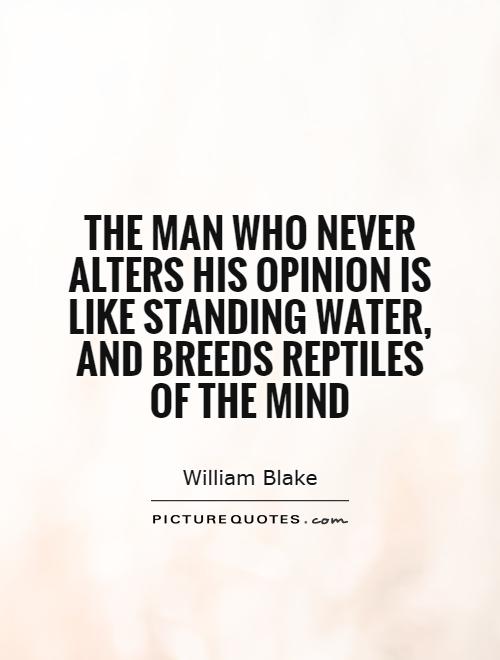The man who never alters his opinion is like standing water, and breeds reptiles of the mind

The man who never alters his opinion is like standing water, and breeds reptiles of the mind
William Blake, the renowned English poet, painter, and printmaker, was known for his revolutionary ideas and unyielding beliefs. He was a visionary who challenged the norms of his time and refused to conform to societal expectations. In many ways, Blake embodied the sentiment expressed in the quote, "The man who never alters his opinion is like standing water, and breeds reptiles of the mind."Blake's refusal to alter his opinions and beliefs can be seen in his works, which often challenged the established order and questioned traditional values. He was a staunch critic of the church, the monarchy, and the industrial revolution, believing that they stifled creativity and individuality. Blake's unwavering commitment to his beliefs led him to be labeled as a radical and a madman by his contemporaries, but he remained steadfast in his convictions.
In his poem "The Marriage of Heaven and Hell," Blake explores the idea of duality and the interconnectedness of opposites. He believed that embracing contradictions and embracing change was essential for personal growth and enlightenment. For Blake, stagnation and rigidity were akin to spiritual death, as they prevented individuals from evolving and expanding their consciousness.
The quote, "The man who never alters his opinion is like standing water, and breeds reptiles of the mind," can be interpreted as a warning against intellectual complacency and closed-mindedness. Just as standing water becomes stagnant and attracts harmful creatures, a mind that refuses to change and adapt becomes closed off to new ideas and perspectives. This can lead to the breeding of negative and destructive thoughts, which can ultimately hinder personal growth and creativity.












 Friendship Quotes
Friendship Quotes Love Quotes
Love Quotes Life Quotes
Life Quotes Funny Quotes
Funny Quotes Motivational Quotes
Motivational Quotes Inspirational Quotes
Inspirational Quotes